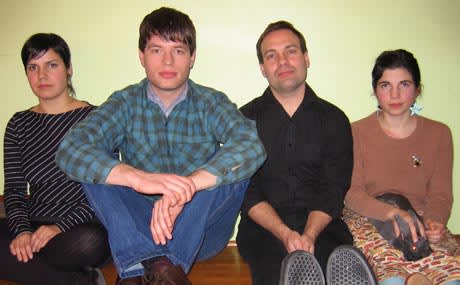These innocently amateurish Vancouver youngsters, led by 22-year-old songwriter Nick Krgovich, have pulled out all the indie pop stops on their third album, Brigadoon, which positively bursts with joy and candour over the course of its 22-song creative whirlwind. Incorporating the foursomes varied pop sensibilities, P:ano unabashedly hold their open-hearted sincerity out for all to see and traipse through a plethora of different sounds with a youthful sense of exuberance and curiosity. They manage to unite the 80s new romantic synth wash ("The Rescuer), Casio-pop heart-pulling ("Heavens) and the mini-rock-opera ("Storm the Gates), giving an outstanding example of three drastically different songs being effectively sequenced together. More stage production-infused fair features on "The Snow and "You the Widow (the two songs that follow them) and the bands familiar indie-pop tenderness is beautifully displayed on "Supermarket One, "Dark Hills, and "Leave Me with the Boy. Overall, P:ano have pulled back the grandiosity they demonstrated on their lavish last album, The Den (which featured a 20-plus member ensemble of players), to get down to primitive basics between their four members. The results are often wildly impressive as P:ano prove to possess wonderfully inherent pop craft, but be warned: a handful of these songs drown in their own overbearing ambition.
What were some of the inspirations for Brigadoon? Singer/guitarist/pianist Nick Krgovich: At this point one of the things were interested in exploring is something that kind of sounds antiquated and old, even though its coming from the present.
What is it that interests you in eras of the past? I think its more just trying to figure out what makes a song because were essentially just writing pop music so what makes something that has the quality that can kind of not date itself. So, not saying that weve accomplished that, but its just something that were trying. By listening to lots of the great American pop songwriters, like Irving Berlin or Rodgers and Hart, where the songs lyrically can be really wry and funny, and they were hilarious to the ears in the 40s but if you listen to them now theyre still really inventive. Those songs are infallible in a way, so it was kind of a meagre, honest attempt at trying to create something like that with the resources we had. I think in some ways that might be the ultimate goal: to try to create music thats not just going to blow over as the years go on.
(Mint Records)What were some of the inspirations for Brigadoon? Singer/guitarist/pianist Nick Krgovich: At this point one of the things were interested in exploring is something that kind of sounds antiquated and old, even though its coming from the present.
What is it that interests you in eras of the past? I think its more just trying to figure out what makes a song because were essentially just writing pop music so what makes something that has the quality that can kind of not date itself. So, not saying that weve accomplished that, but its just something that were trying. By listening to lots of the great American pop songwriters, like Irving Berlin or Rodgers and Hart, where the songs lyrically can be really wry and funny, and they were hilarious to the ears in the 40s but if you listen to them now theyre still really inventive. Those songs are infallible in a way, so it was kind of a meagre, honest attempt at trying to create something like that with the resources we had. I think in some ways that might be the ultimate goal: to try to create music thats not just going to blow over as the years go on.




